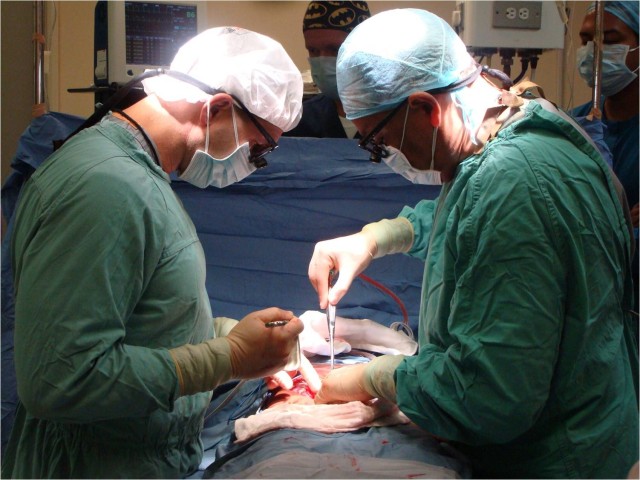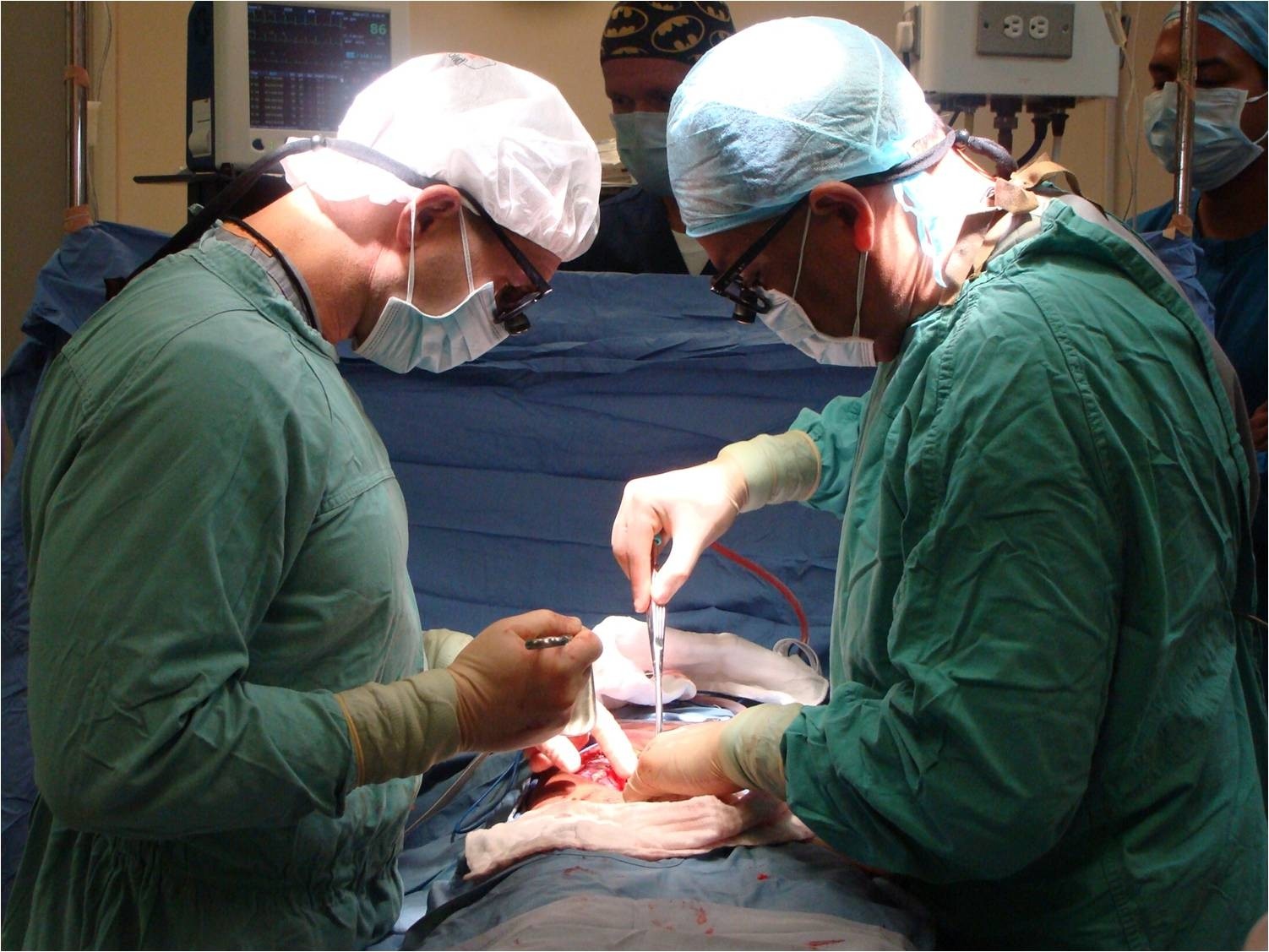WASHINGTON (Aug. 22, 2008) -- Lt. Col. Edward Falta, chief of the Walter Reed organ transplant service and Dr. Rahul Jindal, assistant chief, performed the first kidney transplant operation in the Co-operative Republic of Guyana, July 12.
The landmark, living donor surgery involved two simultaneous operations: harvesting a healthy, compatible kidney from a 41-year-old mother for transplant to her 18-year-old son in end-stage renal failure. The teenager's kidney function was so poor that Jindal said the situation was like "throwing the dice every week" on how long he would survive.
Jindal led the team of five Army medical professionals who traveled to the small, South American country, the size of Idaho, for the humanitarian effort. The group trained their Guyanese medical counterparts.
Falta and Jindal, along with Lt. Col. Melanie Guerrero, a Walter Reed Army Medical Center critical care physician, Spc. Laura Owen, a WRAMC transplant technologist, and Art Womble, a certified nurse anesthetist from Athens-Limestone Hospital in Athens, Ala., who donated their skills and vacation time to perform the milestone surgery. The Walter Reed team members perform about 30 transplants a year at WRAMC.
Falta explained all the critical pre-operative lab tests were conducted at Walter Reed, such as tissue-typing, cross-match. Walter Reed has the only HLA (human leukocyte antigen) lab in the military and one of the oldest in the country, according to Falta. The team used WRAMC surgical instruments and returned them to the hospital after the operations.
It took four months to set up the infrastructure necessary to perform the procedure at Georgetown Public Hospital. From their WRAMC location, the Walter Reed team supervised operating room preparations and staffing.
It all began when the teenager was diagnosed with kidney failure two years ago. Soon after, he quit school, suffering chest pain, general malaise and chronic fatigue. He received dialysis whenever his single mother, who worked as a roadside vegetable vendor, was able to scrape the money together.
"Sometimes the bus ride into town to sell the vegetables cost more than what she was able to make" Jindal said.
According to 2006 United Nations statistical data, the per capita annual income in Guyana was $1,219 compared $43,562 in the United States.
"Dialysis is a very expensive life-saving procedure and in Guyana it costs $500 cash per session. And, we usually require three times a week and these people have to pay out of their pockets, so for a developing country it's a big problem. A huge economic drain on the community, on the government and the people themselves," Falta said.
The struggling mother tried every way she could to raise money for dialysis. When a flyer soliciting funds landed in the hands of a Guyanese philanthropist living in Queens, N. Y., the wheels were set in motion for the ground-breaking surgery.
Jindal explained original efforts were geared to find money to send the teenager to India for a transplant. "They do surgery at the cost of one tenth that in the United States. It costs $150,000 for a transplant here. In India, it's $35,000." But Dr. Leslie Ramsammy, Guyana minister of health and president of the World Health Assembly had another idea.
Ramsammy suggested that the surgery be done, in country. "It would be a big boost...there were 250 patients [needing kidney transplants], and they can't afford to send all the patients to India," Jindal said.
"A kidney transplant is still cheaper than dialysis," Falta said. "Here in the United States, dialysis is shown to decrease your lifespan five to eight years."
Jindal was open to the idea, pondering whether they could teach transplant techniques to the Guyanese surgeons and step back after a few years, leaving them to perform the procedure on their own.
"When he [Jindal] came and described the situation it was the exact same thing I tried to do on my own," Falta said.
In 2004, Falta attempted to save 16-year-old Honduran girl in renal failure, waiting six months to navigate the U.S. government administrative and logistical channels. The girl died from inadequate dialysis before Falta could receive the green light to perform the transplant.
Guyana's first kidney transplant operation took nearly seven hours to complete, without complications. Jindal said the transplant receipient's prognosis looks excellent.
Through phone calls and e-mail, Jindal helps the medical staff in Guyana manage the follow-up health care management issues that arise. The Guyanese government will pay for the medicine the teen must take for the rest of his life.
A full month after the epic surgery, the young patient is doing well. He is back in school, enrolled in Information Technology classes.
"The surgery added to the morale of the staff of the GPHC [Georgetown Public Hospital in Guyana] and in many ways has contributed to the upgrading of the services in general at the GPHC," Ramsammy said.
"Transplantation makes a good humanitarian instrument for the U.S. government because it is long-term and turns a negative situation into a positive one. [The patient] doesn't just stop dialysis but he goes back to school and back to work - he contributes to society instead of being a drain," Falta said.
Jindal's next transplant mission trip to Guyana is scheduled for Nov. 12, when he plans to do two more kidney transplants. The government of Guyana has promised to supply post-transplant medications free to the first 20 patients.


Social Sharing